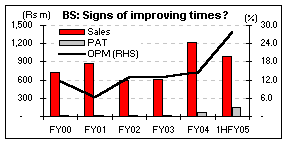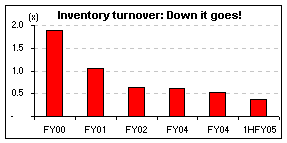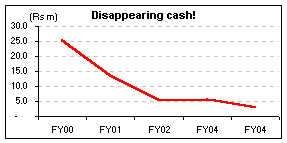| Issue Summary |
|
| ||||||||||||||||||||||||||||||||||||||||||||||||
| Issue structure |
|
|
| Background |
|
| Business | |||||||||||
|
Bharati Shipyard (Bharati) is a private sector shipyard engaged in the design and construction of various types of sea going, coastal, harbor, inland crafts and vessels. The company owns shipyards at Ratnagiri and Ghodbunder (both in Maharashtra). Apart from these owned shipyards, the company also hires facilities in Goa as and when required. Some of the ships, among others, that Bharati can deliver with its present facilities are offshore supply vessels, tankers, ferries and cargo ships.
Bharati has a total workforce of 1,127, out of which 907 are contract workers. The company has plans to acquire a shipyard in Goa and has entered into a MoU with Pinky Shipyard Pvt. Ltd. This move will help Bharati enhance its capacity and reduce costs incurred on account of hire charges. Over the past four years (FY00-FY04), the company has grown its sales and profits at CAGR of 14% and 42% respectively. However, a large part of this growth has come about in the past two years. For Bharati, the two major objects of this public issue are:
| |||||||||||
| Promoters | |||||||||||
|
Mr. P.C. Kapoor and Mr. Vijay Kumar, two qualified Naval Architects from IIT Kharagpur, in association with Bharati Shipping & Dredging Co. Pvt. Ltd., promoted Bharati in 1976. Both the promoters have over 35 years of experience each, in the business of shipbuilding. | |||||||||||
| Sector | |||||||||||
|
The fortunes of global shipbuilding industry are closely related to the shipping industry, which moves around 80% of the international trade. In the past two decades, world seaborne trade has increased at a CAGR of 1.8% and the move has been in cycles. Apart from the expected high growth in world trade, there are several other factors that have contributed to the growth in demand for ships and consequently greater orders for the shipbuilding industry. Some of these factors include:
Apart from trends in freight rates, the cyclical nature of the global shipbuilding industry is guided by the undermentioned factors. These factors lead to an uneven flow of work at the shipyards. Factors affecting the industry...
According to Bharati's prospectus, Japanese and South Korean shipbuilders presently dominate major segments of the ship construction industry. In 2002, for instance, while Japan had a share of 37% of the global shipbuilding market, South Korea commanded 28%. As for the Indian shipbuilding industry, despite having a latent and significant demand from the domestic market, has suffered on account of lack of commitment, cost overruns, poor quality construction and delayed delivery. However, going forward, Indian shipyards are likely to gain in the shipbuilding and ship repair market due to the following reasons:
| |||||||||||
| Reasons to apply |
|
|
Growth in India's seaborne trade: As indicated earlier, fortunes of the shipbuilding industry are closely tied to those of the shipping industry. In the past year, the global shipping industry has benefited tremendously from the rise in global trade, especially in the tanker segment. We believe that as the Indian economy grows at a faster rate, demand for support and smaller vessels will increase in the long-term. This could benefit shipbuilders like Bharati. As a matter of fact, 95% of India's export trade by volume and 75% by value is carried through the sea rout. This, in itself, presents a big potential for shipyards like Bharati to grow in the future. We do not expect Bharati to be a big player in the bigger vessels (say tankers, bulk carriers, liners). Besides, given the investments in the oil exploration by Indian and multinationals in the Indian coastal line and in the Middle East, demand for offshore support vessels will increase. Bharati has already secured orders from GE Shipping for two anchor handling supply vessels. Such industry trends is a positive for the company. | |
|
Government's Sagar Mala project: The Government of India has announced a major project called 'Sagar Mala' that aims to develop India's maritime sector. Through this project, the government plans to expand capacity and modernize the port sector across India's vast coastline. It is estimated that the project will result in additional demand for around 2,400 ships. This is good news for Bharati as it is among the leading private sector shipbuilders in the country. | |
|
Better vis-à-vis domestic competitors: While Bharati faces competition from international shipbuilders in terms of the latter's better standards of automation, it has an upper hand over the Indian PSU shipyards. The PSU shipyards under the ministry of shipping have witnessed steady erosion of their profitability and order book position due to the high cost of manufacture, poor delivery and quality standards. On the contrary, private sector shipyards like Bharati have proven to be more efficient and competitive through their focus on value addition and specialised offerings. This is likely to stand in good stead for Bharati as it bits for more complex assignments from both Indian and foreign shipping companies. | |
| Reasons not to apply |
|
|
Highly volatile market: As mentioned earlier, shipbuilding is a highly volatile market that is dependent on the global business and trade cycles and on several other factors like oil prices, scrapping of old vessels, economic and political stability and growth of world seaborne trade. These factors lead to an uneven flow of work to shipyards. Importantly, since there is a big gestation period between the order and delivery of ships, any negative change in the global business climate can have significant impact on the shipbuilding industry. Moreover, since movements in freight rates also guide the fortunes of the shipbuilding industry, speculation usually builds up as shipbuilders rapidly increase capacities on account of excess ordering. This can have serious bearing on the shipbuilders. Bharati Shipyard, being very small in size as compared to its global peers, is likely to be one of the biggest losers as and when such a situation would arise in the future. | |||||||||||||||||||
|
Rising labour costs in India: The Indian shipbuilding industry has benefited on the back of relatively low labour costs than its peers in the developing world like Korea, Malaysia, Singapore and Thailand. However, owing to the private Indian shipbuilders taking on complex assignments and that the required talent is hard to be found, costs are likely to increase going forward. This is likely to affect operating margins of Bharati and consequently its profitability. Also, the fact that the cost advantage has been the sole competing factor for Indian shipyards as most of them operate at low levels of automation, rising labour costs might be a dampener on the company's growth going forward.
| |||||||||||||||||||
|
Disappearing cash: One big impediment for Bharati's future growth is its declining cash and bank balance. This seems a reason of the company's highly volatile receivables and declining inventory turnover. While we understand that shipbuilding is a large gestation business (there is a large duration between order and delivery of ships), reducing inventory turnover means greater pressure on Bharati's cash flows and its ability to fund future growth through internal accruals. On the other hand, if the company goes in for further issue of equity to fund expansion operations, it would lead to dilution of earnings.
| |||||||||||||||||||
| Financial Performance |
|
| (Rs m) | FY03 | FY04 | 1HFY05 | ||
| Sales | 611 | 1,217 | 988 | ||
| Other income | 2 | 1 | 2 | ||
| Total income | 613 | 1,217 | 989 | ||
| Expenditure | 534 | 1,042 | 716 | ||
| Operating profit | 78 | 175 | 272 | ||
| OPM (%) | 12.7% | 14.4% | 27.6% | ||
| Depreciation | 4 | 4 | 2 | ||
| Interest | 60 | 78 | 48 | ||
| Profit before tax | 16 | 93 | 223 | ||
| Tax | 4 | 33 | 78 | ||
| Net profit | 12 | 60 | 145 | ||
| NPM (%) | 1.9% | 4.9% | 14.6% | ||
| No. of shares | 10.0 | 10.0 | 10.0 | ||
| EPS (Rs) | 1.2 | 6.0 | 28.9 | ||
| P/E ratio (x) | 2.3 | ||||
| Comparative valuations & comments |
|
|
While there is no Indian comparison for Bharati Shipyard as it will be the first listed shipyard, we have measured its performance vis-à-vis the private sector shipping major, Great Eastern Shipping Co (GESCO). We have not compared with other Korean and Japanese shipbuilding majors because Bharati's production capacity is largely different. Based on our FY05 estimates of book value for both the companies, while GESCO (at Rs 192) trades at 1.9 times, Bharati's price to book value is lower at 1.2 times (at the higher band of Rs 66).
Note: Calculations are based on 1HFY05 numbers Even when one compares other parameters like price to earnings and price to sales, Bharati comes at a discount to GESCO. As we have mentioned above, since Bharati is one of the efficient private sector shipbuilders in the country and that it has been consistently getting orders from large players like GESCO and Reliance Industries, we are positive about its future performance. However, factors like small size of the company and highly volatile nature of the business are the foremost cause of concerns. |
Equitymaster.com is one of India's premier finance portals. The web site offers a user-friendly portfolio tracker, a weekly buy/sell recommendation service and research reports on India's top companies.











 © 2025
© 2025